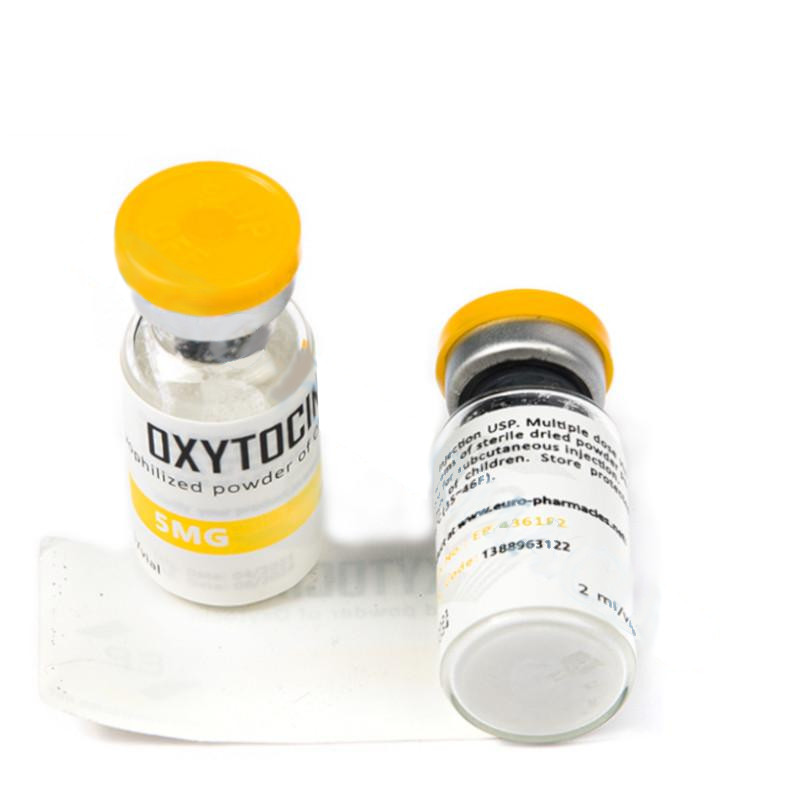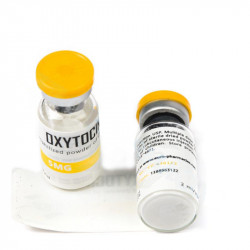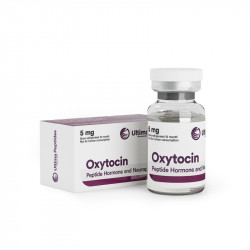

ATTENTION!
- MINIMUM ORDER cost is required $100 for EU DOMESTIC!!
PMR Team.
Oxytocin 5mg Gold - Euro-Pharmacies - EU
Oxytocin is a hormone secreted by the posterior lobe of the pituitary gland, a pea-sized structure at the base of the brain.
It's sometimes known as the "cuddle hormone" or the "love hormone," because it is released when people snuggle up or bond socially. Even playing with your dog can cause an oxytocin surge, according to a 2009 study published in the journal Hormones and Behavior. But these monikers may be misleading.
Oxytocin can also intensify memories of bonding gone bad, such as in cases where men have poor relationships with their mothers. It can also make people less accepting of people they see as outsiders. In other words, whether oxytocin makes you feel cuddly or suspicious of others depends on the environment.
Oxytocin in women
Oxytocin is a particularly important hormone for women. "Oxytocin is a peptide produced in the brain that was first recognized for its role in the birth process, and also in nursing," said Larry Young, a behavioral neuroscientist at Emory University in Atlanta, Georgia.
The hormone causes uterine contractions during labor and helps shrink the uterus after delivery. When an infant suckles at his or her mother's breast, the stimulation causes a release of oxytocin, which, in turn, orders the body to "let down" milk for the baby to drink.
Oxytocin also promotes mother-child bonding. Studies show that "female rats find pups to be aversive if [the females are] virgins," Young told Live Science. "But once they give birth, the brain is transformed, so they find the pups irresistible," he said. And similar findings are seen in humans.
A 2007 study published in the journal Psychological Science found that the higher a mom's oxytocin levels in the first trimester of pregnancy, the more likely she was to engage in bonding behaviors such as singing to or bathing her baby. [11 Interesting Effects of Oxytocin]
Although maternal bonding may not always be hardwired — after all, human females can adopt babies and take care of them — oxytocin released during pregnancy "does seem to have a role in motivation and feelings of connectedness to a baby," Young said. Studies also show that interacting with a baby causes the infant's own oxytocin levels to increase, he added.
Oxytocin in men
In men, as in women, oxytocin facilitates bonding. Dads who got a boost of oxytocin via a nasal spray played more closely with their 5-month-old babies than dads who didn't get the hormone zap, a 2012 study found. (There is another hormone, called vasopressin, which plays a stronger role in men.)
This anti-social effect of a social hormone brings some nuance to the story of oxytocin. In one study, researchers found that Dutch students given a snort of the hormone became more positive about fictional Dutch characters, but were more negative about characters with Arab or German names. The finding suggests that oxytocin's social bonding effects are targeted at whomever a person perceives as part of their in-group, the researchers reported in January 2011 in the journal PNAS.
In another study, published in PNAS in 2010, men were given a dose of oxytocin and asked to write about their mothers. Those with secure relationships described their moms as more caring after the hormone dose. Those with troubled relationships actually saw their mothers as less caring. The hormone may help with the formation of social memories, according to the study researchers, so a whiff strengthens previous associations, whether good or bad.
"My view of what oxytocin is doing in the brain is making social information more salient," Young said. "It connects brain areas involved in processing social information — whether it's sights, faces, sounds or smells — and helps link those areas to the brain's reward system."
Oxytocin sprays and side effects
Oxytocin nose sprays also have been considered for use in treating autism. The neurological disorder is marked by struggles with social functioning, so a small 2013 study published in the journal PNAS gave a dose to children and teens with autism and asked the participants to identify emotions based on pictures of people's eyes.
The participants weren't any better at identifying the emotions after the oxytocin burst, but the regions of their brains associated with social interaction became more active. The increased processing could mean that a burst of oxytocin might help cement behavioral therapy for kids with the disorder.
"When you think about using oxytocin to treat diseases like autism, you want to make sure you do it in a context where the social information is positive," Young said.
Use of oxytocin sprays outside of a medical context is far murkier, however. The sprays sold online without a prescription promise stress relief and social ease, but they are not regulated by the Food and Drug Administration (FDA). That means that nothing is known about their efficacy, side effects, or even whether they contain any oxytocin.
There are no long-term studies on the side effects of the legitimate oxytocin sprays used in hormone research; most studies give people one dose of the hormone only. Pitocin, a synthetic version of oxytocin given intravenously to stimulate labor, has side effects that include nausea, vomiting and stomach pain.
-
Peptide Hormone
-
No
-
No
-
No
-
No
-
No
Add a Review
Your email address will not be published. Required fields are marked *
Submit a Photo
Your email address will not be published. Required fields are marked *






